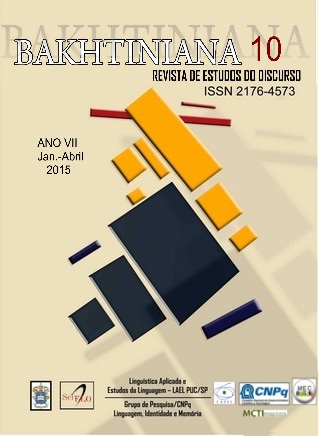The Self and the Other in the Enunciation of Jorge Luis Borges
Keywords:
Self-consciousness, Alterity, Other, Enunciation, Jorge Luis BorgesAbstract
This study addresses the issue of heterogeneity derived from the unfolding of the self, as understood by Bakhtin. It is based on the idea of self-consciousness, i.e., the one that always generates another to ensure their own subjectivity by means of contact with possible alterities: others are generated as alterity from the self. According to the ternary (time) and trinitarian (space) set, theorized by Benveniste and analyzed by Dufour, our analysis is circumscribed to three short stories of Jorge Luis Borges, namely: “The Other,” “August 25, 1983,” and “Borges and I,” in which the double and the duplicate are approached as the self, even being others, for it is alterity that gives the means to know the self.
Metrics
Metrics Loading ...
Downloads
Published
2015-04-30
How to Cite
Cavalheiro, J. dos S. (2015). The Self and the Other in the Enunciation of Jorge Luis Borges. Bakhtiniana. Revista De Estudos Do Discurso , 10(1), Port. 75–86 / Eng. 80. Retrieved from https://revistas.pucsp.br/index.php/bakhtiniana/article/view/20825
Issue
Section
Articles








